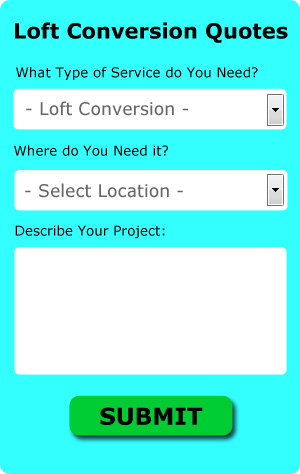Parkeston Loft Conversions (CO12): For the most part the most popular method by which house-holders create a bit of extra living space in their houses at present is by adding an extension on the building. This can be built on the front, the side or the back and whichever may be the case you will be significantly increasing the footprint of your home. It's possible to develop much more room at a roughly equivalent cost converting your loft, and you'll not expand the footprint at all. One other option of course which might be possible is to have your garage converted, however this is dependant on your having a spare garage that you don't require for parking your car. Usually a nicely converted loft will allow you to preserve your invaluable outside space, add a fair amount of value to your property, is not going to require planning permission and be less messy and disruptive than a traditional extension.
Making a detailed assessment of the costs involved with having a loft conversion will be critical at this early stage. The ultimate cost will be determined by the kind of loft conversion you have and the sort of property that you own. In the United Kingdom (2020) the typical cost of a loft conversion works out at approximately £35,000, which gives you an approximate idea of the level of costs that are involved. If this is something that you're able to afford you should be set to go, if not maybe you should think again.
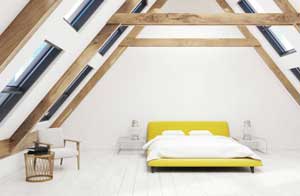
You will have plenty of choice when it's time to figure out just what you should do with the additional living space you gain by having a loft conversion. It might be that you would like to create a playroom where your children can enjoy their own quality space, maybe you want to create an office where you'll be able to work in a quiet and tranquil environment, or perhaps you are in desperate need of an extra bedroom or two for your growing family. Whichever applies to you, a loft conversion is definitely an effective solution to deliver that additional room.
You will need to make certain your loft is a candidate for converting, as not every loft in Parkeston is. One of your first steps should be to get your loft surveyed by a specialist. The most significant issue is the height of the loft space as you must have a height of at least 2.2 metres to successfully do a loft conversion. You could perhaps scramble up into your loft space and measure the height yourself. The kind of roof you have will also be an issue, rooves with rafters are cheaper and easier to convert than ones with trusses.
A solution that you could maybe think about is a shell loft conversion, if you're proficient at do-it-yourself. This is where all of the main structural work, such as external windows and doors, structural floor, roof alterations, mansard/dormers, steel beams and stairs is completed. The householder (namely you) is left to finish off the rest of the work at his / her leisure.
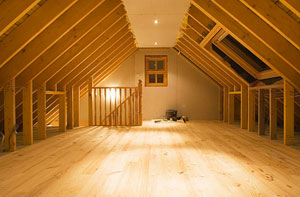
Types of Loft Conversion: The main styles of loft conversion that you'll come across in Parkeston are: roof lift loft conversions, velux loft conversions, dormer loft conversions, hip-to-gable loft conversions, loft pods, mansard loft conversions and roof light conversions.
When you have made the final decision to forge ahead with such a project, it is important that you find a recommended building company who specialise in loft conversions. Try and get some recommendations from neighbours or acquaintances who you know have recently done conversions. There are many sites online who will help you find tradesmen you might try Checkatrade or Rated People, even better try Bark. The outcome of this research should be a short list of prospective Parkeston loft conversion specialists from which to make your selection.
An important consideration when planning a loft conversion in Parkeston is the architectural style of your property. In Parkeston, architectural designs range from modern houses to historical cottages, showcasing the area's diversity and rich heritage. For a seamless loft conversion that enhances your home's overall aesthetics, working with a local builder experienced in handling different architectural styles is vital. They can provide valuable insights and design suggestions, tailored to the character of your home. In addition, it is advisable to consult with a qualified professional to ensure that your loft conversion undertaking complies with all local building regulations and conservation guidelines, as preserving the heritage and charm of local neighbourhoods is essential.
The Benefits of a Loft Conversion
For those residing in Parkeston, the act of converting a loft offers numerous personal and practical benefits:
- Enhanced property value: Successfully converting your loft can add a significant asset to your home, greatly increasing the property's market value.
- Cost-effective alternative: Potentially offering greater savings in the long run, opting for a loft conversion over moving to a larger property can be a financially savvy way to acquire extra space.
- Maximising existing space: By opting for a loft conversion, you can transform an often-neglected area of your existing home into priceless living space, making use of previously wasted potential.
- Improved energy efficiency: By using existing structures and walls within your existing footprint, loft conversions can be a more energy-efficient alternative to building a regular extension.
- Enhanced Home Layout: A loft conversion can be the answer if your current layout feels a bit restrictive. It can significantly improve the flow throughout your home. By adding bathrooms or relocating bedrooms to the loft, you'll free up space in other areas, making your property more adaptable to contemporary living.
- Increased flexibility: Adapting to your evolving needs, the converted loft allows for the flexibility needed by growing families, the accommodation of guests, or the creation of specialised spaces for hobbies or work.
- Increased living space: Undeniably, the foremost advantage of converting a loft lies in the provision of extra living areas, bedrooms, bathrooms, or specific work areas.
To summarise, a loft conversion offers a flexible solution for creating a higher quality living environment and adding further space within your existing property in Parkeston. Increasing your property value and possibly even providing you with additional rental income are just a couple of the financial advantages this offers. Additionally, it provides a number of practical advantages such as potential energy savings and additional living space. Consequently, it presents a strong option for house owners in Parkeston who are wishing to enhance their living experience.
Loft conversions are available in Parkeston and also nearby in: Shotley, Shop Corner, Bradfield Heath, Tendring, Stones Green, Erwarton, Wix, Dovercourt, Harkstead, Ramsey, Little Oakley, Parkeston Quay, Harwich, Upper Dovercourt, Wrabness, Great Oakley, and in these postcodes CO12 4PB, CO12 4PY, CO12 4BQ, CO12 4FE, CO12 4SG, CO12 4BT, CO12 4PF, CO12 4BB, CO12 4AX, and CO12 4BE. Local Parkeston loft conversion specialists will most likely have the telephone dialling code 01255 and the postcode CO12. Checking this out can ensure that you access locally based providers of loft conversion. Parkeston property owners are able to benefit from these and many other related services. Click the "Quote" banner to get estimates for loft conversions.
House Extension Parkeston
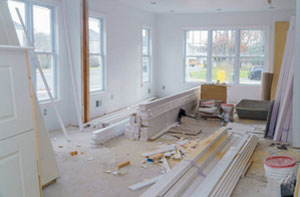
There are naturally other ways to add more space to your home in Parkeston. Possibly the most favoured way that householders accomplish this is with a home extension. Home extensions in Parkeston are only possible if you have adequate space surrounding your property. It will also rely on gaining planning permission from the local council. Extending your house could affect immediate neighbours and that is why getting the appropriate planning permission is necessary. Often the same building firms who do loft extensions will also carry out home extensions. Extending your home is likely to be disruptive and will also increase the footprint of your property. You'll need to be aware about a number of things when thinking about a house extension in Parkeston, including: inherant soil conditions, demands on services, rights of way, shared walls, access to the site, the likelihood of flooding and nearby trees. The typical cost of house extensions Parkeston in 2020 are roughly £1,500 and £2,000 per M2. Click for Parkeston Home Extension QUOTES
Dormer Windows Parkeston
Parkeston's homes are characterised by the widespread use of dormer windows, a feature that elevates both aesthetics and functionality. These vertical protrusions from sloping roofs serve a dual purpose: providing additional space and flooding attic or loft areas with natural light. For homeowners in Parkeston, dormer windows are the key to unlocking the full potential of their upper floors, making them desirable living spaces.
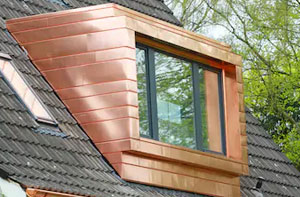
In Parkeston, many older homes with steeply pitched roofs benefit greatly from the addition of dormer windows. This modification not only increases headroom but also adds a distinctive charm to the building's exterior. The extra light and ventilation provided by dormer windows make attics and lofts more comfortable, transforming underutilised spaces into bedrooms, studies, or playrooms.
Skilled local builders in Parkeston are proficient in fitting dormer windows, making sure they integrate well with the current roof structure. The installation process requires thorough planning to align with the home's style and adhere to local building codes. Thus, dormer windows are a popular option for Parkeston home and property owners seeking to boost both the functionality and aesthetic appeal of their homes. (Dormer Windows Parkeston)
Loft Buds
When it comes to adding extra space to your property without the hassle of a full-scale loft conversion, loft buds are an ideal solution. Essentially compact extensions or additions to your loft, they're designed to provide a practical and cost-effective way to create more living or storage space. Whether you need a small office, a peaceful reading nook, or just somewhere to stash your belongings, loft buds can transform an otherwise underutilised area of your home in Parkeston and make the most of your property's potential.
Loft buds are so appealing because of their straightforward approach. They let you make good use of your loft space without needing the extensive work that's often part of a traditional loft conversion. By installing something as simple as a skylight or a staircase, you can easily turn your loft into a practical area. They're particularly well-suited to homes with lower headroom, as they are designed to fit seamlessly within your property's current layout. It's a clever, affordable solution to create more space without excessive costs or disruption.
If you're a homeowner wanting to maximise your loft space, then loft buds are a fantastic option. They bring not only practicality to your home but also enhance its overall charm and value. With the right professional guidance and some careful planning, a loft bud can be tailored to meet your unique needs and style. It's a creative and reasonably priced way to tap into the potential of your loft area, all while maintaining a sense of openness and functionality in your home in Parkeston. (Tags: Loft Buds Parkeston).
Hip to Gable Loft Conversions
A hip to gable loft conversion is an excellent way to add more space to your home, particularly if you have a hipped roof. This type of roof slopes on all sides, which can limit the usable loft space. A hip to gable conversion involves extending one or more of these sloping sides (or "hips") and converting it into a vertical wall, known as a "gable." This extension creates more headroom and floor space, turning an underused loft into a spacious, functional room.
Homeowners in Parkeston, particularly those with semi-detached and detached properties, really love this style of conversion. The added room can significantly change how they can arrange their living spaces. Many choose to use this room as an extra bedroom, a comfortable home office, or even a little living room. In addition to providing more space, a hip to gable conversion can raise the property's value, making it a sensible investment if you want to improve your living conditions and increase the worth of your home.
Depending on your property and location, planning permission might or might not be needed, but a reliable architect or builder will guide you through any planning requirements. With thoughtful planning and the right team on board, a hip to gable loft conversion can really transform your Parkeston home, giving you a stylish, spacious new area that suits your needs perfectly. (Tags: Hip to Gable Loft Conversions Parkeston)
Mansard Loft Conversions
Mansard loft conversions are a favoured choice among householders seeking to increase their living space. By modifying the slope of a roof, this loft conversion style creates a flat roof with a steeper angle on one side. Low-ceiling loft spaces benefit greatly from this design due to the maximisation of available headroom.
Another plus side to mansard loft conversions is that they extend the walls at a steep angle, optimising the area of usable floor space. The significant increase in living space provided by this kind of conversion has led many homeowners in Parkeston to create an additional bathroom or bedroom. Householders seeking to boost the value of their house often select mansard loft conversions, which can add considerable value to a home.
The design flexibility of mansard loft conversions allows home and property owners to customise the space to suit their particular requirements, from creating a playroom for children to a home office. The major structural changes involved in a mansard conversion might require planning permission, which distinguishes it from other sorts of loft conversions. Obtaining all necessary permissions and guiding you through the process is something that a reliable loft conversion company can do. A specialist loft conversion company can provide expert advice on the viability of a mansard loft conversion and handle the entire process from planning to completion. (Tags: Mansard Loft Conversions Parkeston)
Loft Conversion Architects: Bringing Your Vision to Life
When you're planning a loft conversion, enlisting the help of an experienced architect can truly make a big difference. This sort of project changes unused space into a stylish and functional part of your home, whether it's an additional bedroom, an office, or a living area. Architects who specialise in loft conversions know exactly how to maximise your property's potential in Parkeston, ensuring the design is both practical and visually appealing. Their expertise enables them to navigate challenges like low headroom or awkward layouts, resulting in a space that perfectly meets your requirements.

When you hire a loft conversion architect, one of the standout benefits is their ability to handle the technical details for you. They manage everything from creating detailed plans and securing the necessary planning permissions to ensuring the design aligns with building regulations. Their expertise in structural requirements and innovative solutions ensures that your conversion is both safe and efficient, as well as beautifully designed. Whether it means adding skylights for extra light or developing clever storage solutions, architects certainly know how to bring your ideas to life without going over your budget.
Aside from managing the technical details, architects enhance the overall value of your loft conversion by personalising it to your specific needs. They'll carefully plan how the new space will integrate with the rest of your home, creating a cohesive flow and design. By investing in an experienced architect, you're not just expanding your living area - you're also boosting the value of your property. For homeowners in Parkeston, a loft conversion is a thrilling upgrade, and the right architect will ensure it's a hassle-free and fulfilling experience. (Loft Conversion Architects Parkeston).
Cellar Conversion
Yet another effective way to add extra living space to your house is to undertake a cellar or basement conversion. Only specific types of property are appropriate for this form of conversion, normally Period or Victorian properties, as opposed to modern day ones. A few post-war properties could also have basements and if you happen to be fortunate enough to have the luxury of a cellar, you should get the most from it? A cellar conversion doesn't only generate extra living space but also help to fix dampness troubles. Quite a few homeowners only use their cellars as a dumping ground (or storage) for a selection of household waste, much like what folks use their lofts for. Your basement can be much more than simply storage, with an entertainment zone, a gymnasium or a home office being among the most favoured alternatives. A self-contained apartment or an additional bedroom are amongst the other alternatives if your basement is large enough.
GET A QUOTATION FOR A CELLAR CONVERSION HERE
Roof Light Conversions
If you are looking for a design of conversion that does not need any adjustments to the pitch and shape of the roof, a "roof light loft conversion" might be the answer. This sort of conversion requires just putting in skylights, fitting an access staircase, and installing an adequate floor. Only lofts that currently have adequate roof space and don't need extending in any way, are suitable for roof light loft conversions.
Parkeston Loft Conversion Quotes
The process of obtaining comprehensive and accurate quotes for your loft conversion is crucial when planning your project. Kickstart the process by conducting research on reliable loft conversion specialists in the Parkeston area and soliciting comprehensive quotations from various service providers. Confirm that the quotes include all necessary aspects, comprising permits, materials, design, labour, and any extra services. Inviting the loft conversion companies to your property for a comprehensive assessment before they prepare a quote is recommended. Set aside ample time to meticulously review and compare the quotes, taking into account the pricing, quality, and trustworthiness of each company. Once the price quotes have been gathered and the options have been carefully assessed, make a point of asking for references or viewing past loft conversion projects carried out by the companies, as this can provide useful insights into their skill and customer satisfaction. Keep in view that placing your investment in a reputable and competent loft conversion specialist is essential to obtain a satisfactory and successful result. (25725 - Loft Conversion Quotes Parkeston)
Local Loft Conversion Enquiries

Current loft conversion customer projects: Mr Joshua Lloyd in Wix needs to find somebody to convert his garage. Tyler Harper in Erwarton wants someone to convert a garage. Steven Murphy in Shop Corner asked the question "is there anyone who does loft conversion near me?". Adam Miller in Bradfield Heath needs somebody to provide a quotation for a conversion in his property just outside Bradfield Heath. Jordan Roberts was asking about the cost of a loft conversion in Upper Dovercourt. Anthony Reynolds in Bradfield Heath needs somebody to provide a quotation for a conversion in his property just outside Bradfield Heath. Brittany Phillips from Ramsey needs someone to provide a price for a loft conversion in her farmhouse in Ramsey. Mr and Mrs Spencer need a loft conversion company in Bradfield Heath to determine if their farmhouse is suited for converting. Mr and Mrs Thomson need a loft conversion company in Shotley to determine if their farmhouse is suited for converting. Mr and Mrs Cooper need a loft conversion company in Bradfield Heath to determine if their farmhouse is suited for converting. Benjamin Pearce in Harkstead wants someone to convert a garage. Andrew Day and Sara Day from Upper Dovercourt want somebody who can replace the insulation and board out their loft space. Mrs Harvey asked about a loft conversion specialist or builder to supply a price for a loft conversion in Bradfield Heath. All these property owners searched for "loft conversion near me" and located this website on either Yahoo, Bing or Google.
Parkeston Loft Conversion Tasks

Parkeston loft conversion specialists will likely help you with roofing repair or replacement, property extensions, loft transformations in Parkeston, cheap loft conversions, loft extensions, building control approval, roof light conversions, rooflight loft conversion, shell loft conversions, loft ventilation services, loft conversion plumbing, house extensions, garage extensions, waste removal, post-conversion cleaning & maintenance, estimates of loft conversion cost in Parkeston, loft carpentry, loft conversion ideas in Parkeston, loft refurbishments in Parkeston, bespoke loft storage, dormer loft conversion, part-build loft conversion in Parkeston, roof lift conversions, l-shaped dormer loft conversion in Parkeston, loft makeovers, hip-to-gable loft conversion, the installation of light fittings & switches, loft & garage conversions in Parkeston, soundproofing, loft renovation and other loft related work in Parkeston. Listed are just a selection of the duties that are performed by those specialising in loft conversion. Parkeston contractors will inform you of their entire range of services.
Loft Conversions Near Parkeston
Also find: Parkeston Quay loft conversion, Wrabness loft conversion, Stones Green loft conversion, Dovercourt loft conversion, Shop Corner loft conversion, Great Oakley loft conversion, Harwich loft conversion, Bradfield Heath loft conversion, Ramsey loft conversion, Tendring loft conversion, Erwarton loft conversion, Harkstead loft conversion, Upper Dovercourt loft conversion, Shotley loft conversion, Wix loft conversion, Little Oakley loft conversion and more. There are building companies who do loft conversion in practically all of these places. With their skills and know-how, these professional tradespeople can effectively convert your underused attic space into a stylish and functional living area. When it comes to maximising your property's potential, a loft conversion offers a cost-effective solution, whether you're planning to add a home office, an extra bedroom or a playroom. Local homeowners can get quotations by clicking here. So, why not get cracking with your loft conversion project today!
More: Home Extensions, Loft Solutions, Loft Conversion Companies, Cheap Loft Conversions, Loft Conversion, Loft Conversion Contractors, Dormer Loft Conversions, Loft Conversion Contractors, Loft Conversion Experts, Roof Lift Conversions, Loft Remodelling, Loft Conversion Companies, Home Extensions, Hip-to-Gable Conversions, Loft Extensions, Loft Conversion Firms, Loft Conversion Contractors, Mansard Loft Conversions, Loft Extensions, Loft Conversion Specialists, Roof Light Conversions, Roof Lift Conversions, Roof Light Conversions, Loft Conversion Contractors, Loft Conversion Companies, Loft Conversion Firms, Roof Lift Conversions, Loft Conversion Companies, Cheap Loft Conversion, Cheap Loft Conversion, Roof Lift Conversions, Loft Conversion Contractors, Loft Extensions, Loft Specialists, Loft Conversions.
TOP - Loft Conversions in Parkeston
Loft Conversion Specialists Parkeston - Loft Conversions Parkeston - Loft Alterations Parkeston - Cheap Loft Conversions Parkeston - Loft Conversion Cost Parkeston - Loft Boarding Parkeston - Loft Remodelling Parkeston - Loft Conversion Ideas Parkeston - Loft Conversion Prices Parkeston

